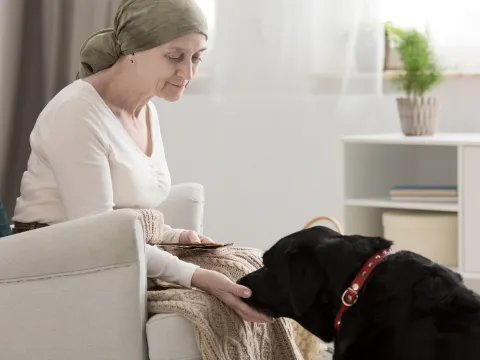- AdventHealth

Choose the health content that’s right for you, and get it delivered right in your inbox.
While end-of-life care can sound scary and overwhelming to those at this stage and their families, the comfort of familiar surroundings and having choices offers a sense of peace during this delicate time.
Many patients choose home hospice care particularly so they can be present for special occasions and holidays. If that’s a choice your family is considering now, know that there is a compassionate team here to help be your guide.
You and your family will not be alone if you opt for in-home hospice care. Whenever that time comes for you or your loved one, we’ll walk you through what to expect.
You Are In Control
It might be easy to assume that when one has reached the end of their life, everything is beyond their control. With home hospice care, that can’t be further from the truth.
Unlike being in a hospital setting, you get to control who and what surrounds you. You can make a schedule with your hospice team, deciding when your doctor, nurse, chaplain and other team members will visit you.
Some patients feel comforted by having their beloved pet close to them, being surrounded by favorite photos and having the freedom to have visitors whenever they desire. Your home is your sanctuary. Whatever you need is completely up to you and your family.
Your Medical Needs and Comfort Come First
When you start hospice care, your team will ensure your medical needs and comfort are the top priority. They may set up things like bedside commodes, a reclining bed or an overhead table. Think of it as your own private hospital room, but in the comfort of your own home. All the medical equipment and medications you require are delivered to your home so that every need is met.
Your hospice team will communicate with your doctor and the hospice physician to discuss your medical history, symptoms and life expectancy. They will compassionately inform you on how to best manage your symptoms as they change and make themselves available should you need them for pain management and discomfort. Your hospice team can offer emotional and spiritual support as well.
Preparing for End-of-Life Care
It’s not easy to think about how you want your final days to be, but it can be so valuable to plan this chapter in advance. Here are some ideas to consider.
- Choose a health care proxy. A health care proxy is an individual who is given the legal right to make health care decisions on your behalf should you be unable to do so. The health care proxy should be a trustworthy individual to think and act in your best interests. Formally identify that person in a document that follows your state’s laws to ensure the agreement is legally recognized.
- Consider your values. What do you want your last days to be like? Do you want more robust medical care to extend your life, or a more passive approach?
- Create an advance directive. This document outlines your intentions for end-of-life care, eliminating any uncertainty about treatment should you be unable to communicate your desires.
- Keep open communication. Make sure you’re communicating about these issues with family members. When everyone understands what you want, family disagreements are less likely to happen during the challenging days ahead.
When the Time Comes
When the time comes to start considering hospice care, we’re here to help you explore all of your options and will be with you and your loved ones every step of the way. We understand the complex feelings this time of life brings, and will support you physically, emotionally and spiritually, keeping your comfort in mind. Know you’re not alone. For more information on the care we can provide for you and your family, visit us here.



